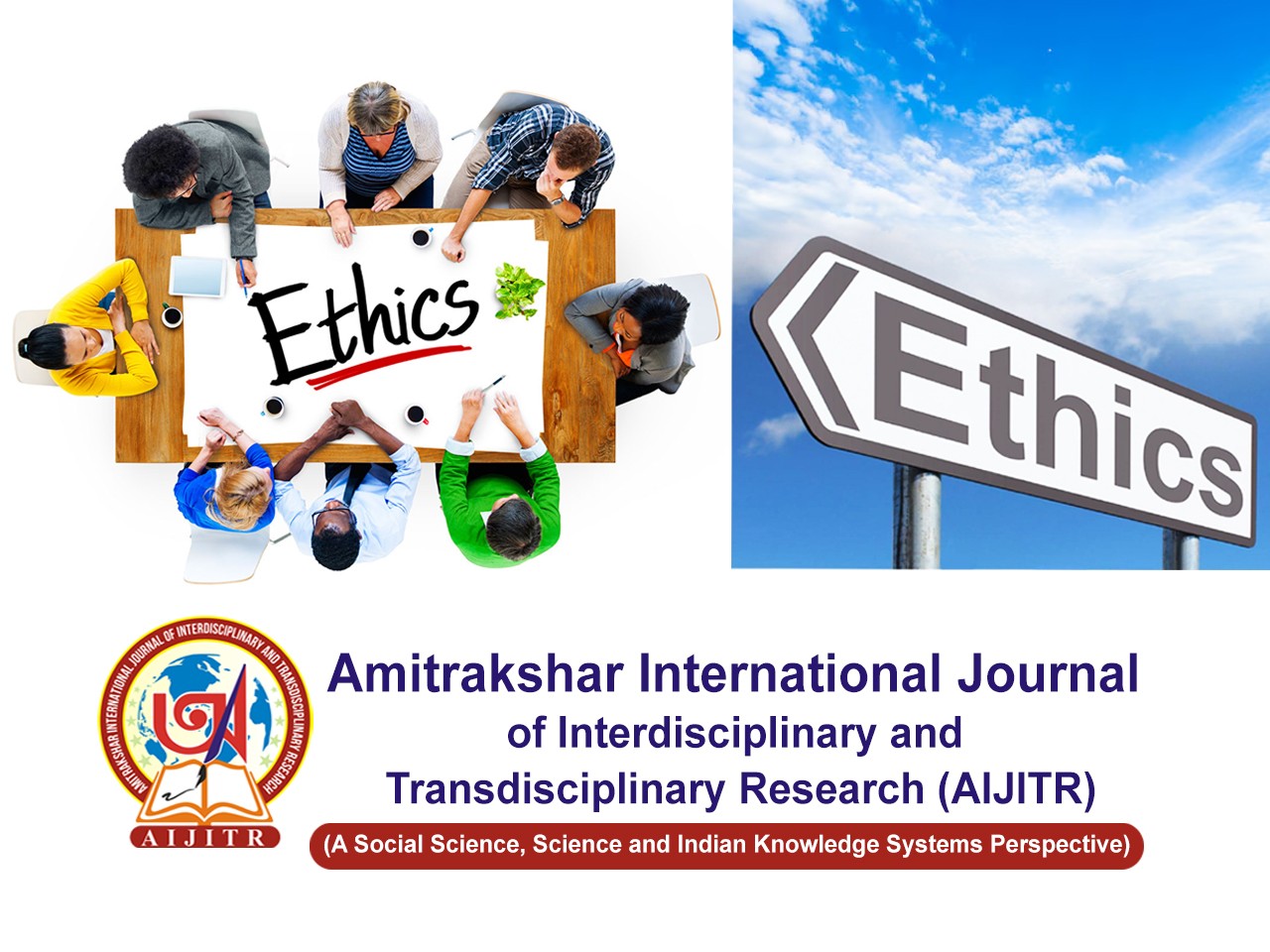

Ethics Policy
The Amitrakshar International Journal of Interdisciplinary and Transdisciplinary Research (AIJITR) is committed to maintaining the highest standards of ethics in scholarly publication. This ethics policy outlines the responsibilities and duties of all parties involved in the publication process—authors, reviewers, and editors. The journal is dedicated to upholding academic integrity, promoting transparency, and ensuring the quality of the research published.
Authors play a vital role in ensuring the integrity of the research process. The ethical responsibilities of authors include the following:
Authors must submit original research that has not been published elsewhere. Any work or words of others used in the manuscript must be properly cited or quoted. Plagiarism in any form is unethical and unacceptable.
Authors should ensure that the data presented in their manuscript is accurate, properly recorded, and can be reproduced by others. Data falsification or fabrication is considered a breach of ethics and will lead to the rejection of the manuscript or retraction of the published article.
All individuals who have made a significant contribution to the research should be listed as authors. Conversely, individuals who did not contribute to the research must not be listed as authors. The corresponding author should ensure that all co-authors approve the final version of the paper and agree to its submission.
Authors should not submit the same research to more than one journal simultaneously. Submitting the same manuscript to more than one journal concurrently is unethical publishing behavior.
Authors must properly acknowledge all sources of data, ideas, or methodologies that influenced their research. Appropriate credit must be given to previous works relevant to the study being presented.
Authors must disclose any financial or other substantive conflicts of interest that may influence the results or interpretation of their research. All funding sources for the project must be disclosed.
Research involving human participants or animals must comply with ethical standards and obtain necessary approval from relevant ethical committees. Authors must include a statement in the manuscript indicating ethical approval and informed consent from participants when applicable.
If an author discovers a significant error or inaccuracy in their published work, they must promptly notify the journal editors and cooperate with them to correct or retract the paper.
Reviewers contribute to the peer-review process and help ensure the quality of research published by AIJITR. Reviewers are expected to act with fairness, confidentiality, and integrity.
Reviewers must treat the manuscripts they review as confidential documents. They must not share the manuscripts with others without the permission of the editor, nor should they use any information from the manuscripts for their personal benefit.
Reviews must be conducted objectively. Reviewers should not allow personal biases, including gender, race, or nationality, to influence their assessment. Criticism should be constructive and based solely on academic merit.
Reviewers should ensure that the authors have properly cited all relevant work. If the reviewer identifies any significant similarity or overlap between the manuscript under consideration and other published work of which they are aware, they should inform the editor.
Reviewers should recuse themselves from reviewing manuscripts where they have conflicts of interest that may affect their objectivity, such as personal relationships, financial interests, or professional competition with the authors.
Reviewers must complete their reviews within the agreed-upon timeframe. If they feel unable to meet the deadline, they should inform the editor as soon as possible.
Reviewers should alert the editor if they have concerns regarding the ethical aspects of a study, such as potential misconduct, data fabrication, or plagiarism. They should also suggest if the manuscript requires further ethical scrutiny.
Editors are responsible for managing the publication process and ensuring that the research published in AIJITR meets the highest ethical standards. The responsibilities of editors include the following:
Editors must ensure that submitted manuscripts are treated confidentially. They should not disclose any information about a submitted manuscript to anyone other than the corresponding author, reviewers, and other editorial advisers, as appropriate.
Manuscripts should be evaluated for their intellectual content without regard to the authors' race, gender, sexual orientation, religious belief, ethnic origin, citizenship, or political philosophy. Decisions to accept or reject a manuscript should be based on its academic merit.
The editor is responsible for deciding which of the submitted manuscripts should be published. The decision should be based on the manuscript's quality, originality, and the reviewers' comments. Editors should ensure a fair and transparent review process and should not allow personal biases or conflicts of interest to influence their decisions.
Editors should ensure that the peer-review process is rigorous, fair, and timely. Manuscripts should be sent to reviewers who have the relevant expertise to provide an informed assessment. Editors must avoid sending manuscripts to reviewers who have conflicts of interest with the authors.
Editors should recuse themselves from processing manuscripts in which they have conflicts of interest. In such cases, another editor should be assigned to handle the manuscript.
Editors must ensure that all research published in the journal complies with relevant ethical guidelines. They should be alert to potential ethical issues such as plagiarism, data fabrication, and unethical research practices. In cases of ethical violations, editors must take appropriate action, such as retracting or correcting articles as necessary.
When errors or inaccuracies are found in published work, editors should promptly correct or retract the article, following clear retraction and correction procedures. The journal must maintain a record of retractions, corrections, and ethical violations to preserve the integrity of the publication process.
The ethics policy of AIJITR is designed to ensure the highest standards of scholarly publication. Authors, reviewers, and editors all share the responsibility of upholding academic integrity, ensuring fairness, and promoting transparency. By adhering to these ethical guidelines, the journal seeks to maintain its reputation for publishing high-quality, reliable research.


